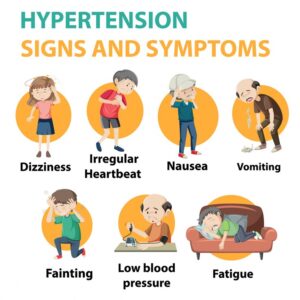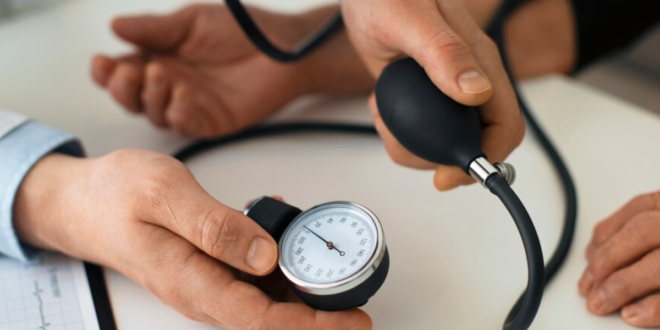The Silent Threat: Introduction to Hypertension
Hypertension, commonly known as high blood pressure, is a condition that silently affects millions of people worldwide. Without noticeable symptoms, it stealthily increases the risk of severe health issues such as heart disease, stroke, and kidney failure. But what exactly is hypertension, and why is it so critical to address?
High blood pressure occurs when the force of the blood against the artery walls is consistently too high. Over time, this increased pressure can lead to significant damage to the arteries and vital organs. The World Health Organization calls hypertension a global epidemic, affecting individuals across various demographics, including those in America, Pakistan, India, and the UK.
Unveiling the Culprits: Causes of High Blood Pressure
Understanding the causes of hypertension is crucial for prevention and management. Several factors, both lifestyle-based and genetic, contribute to the development of high blood pressure.
Lifestyle Factors
- Diet: Consuming excessive salt, processed foods, and alcohol can lead to increased blood pressure.
- Physical Inactivity: A sedentary lifestyle contributes to weight gain, which can elevate blood pressure.
- Smoking: Nicotine raises blood pressure and heart rate, while the chemicals in tobacco can damage the lining of the artery walls.
Genetic Factors
- Family History: Genetics plays a significant role in hypertension. If your parents or immediate family members have high blood pressure, you are at a higher risk.
- Age and Gender: The risk of developing hypertension increases with age, and men are generally more prone to high blood pressure until women reach menopause.
Understanding these factors can empower individuals to make better health choices and reduce their risk of developing high blood pressure.
- Decoding the Signals: Recognizing Symptoms of Hypertension
Hypertension is often called the “silent killer” because it usually presents no symptoms until serious damage has occurred. However, some warning signs may indicate high blood pressure.
Common Symptoms

- Headaches: Severe headaches, especially migraines, can be a symptom of elevated blood pressure.
- Breathlessness: Having difficulty breathing, particularly with minimal effort, maybe a sign.
- Nosebleeds: Unexpected or frequent nosebleeds may be a sign of elevated blood pressure.
The Value of Routine Check-Ups
Routine health examinations are crucial for the early diagnosis and treatment of hypertension. Regular blood pressure checks are recommended, particularly if you have a family history of the disease or other risk factors.
- The Numbers Game: High Blood Pressure Diagnosis
It takes more than one elevated reading at the doctor’s office to diagnose hypertension. A comprehensive approach is necessary to ensure accurate results.
Readings of Blood Pressure
- Two numbers are used to measure blood pressure: diastolic and systolic. The systolic (upper number) measures the pressure in your arteries during a heartbeat, while the diastolic (lower number) measures the pressure in your arteries between beats.
- Normal Range: Typically, a reading of 120/80 mmHg is considered normal. Hypertension is diagnosed when readings consistently exceed 140/90 mmHg.
Additional Tests
- Ambulatory Monitoring: Wearing a portable device that measures blood pressure at regular intervals over 24 hours can provide a more accurate diagnosis.
- Home Monitoring: Regularly using a home blood pressure monitor can help track readings and identify trends.
proper diagnosis is the first step toward effective treatment and management of hypertension.
- Balancing Act: Lifestyle Changes and Treatment Methods
Managing hypertension involves a combination of lifestyle modifications and medical interventions. Achieving a balance between the two can significantly improve health outcomes.
Lifestyle Changes
- Dietary Adjustments: Reducing sodium intake and opting for a diet rich in fruits, vegetables, and whole grains can lower blood pressure. The DASH (Dietary Approaches to Stop Hypertension) diet is highly recommended.
- Regular Exercise: Engaging in physical activities like walking, swimming, and cycling for at least 30 minutes most days can help manage high blood pressure.

Stay Active: Exercise Your Way to Lower Blood Pressure Stay Active: Exercise Your Way to Lower Blood Pressure
- Stress Management: Practices such as mindfulness, meditation, and deep breathing exercises can effectively reduce stress and, consequently, blood pressure levels.
Medical Treatments
- Medications: Depending on the severity, your doctor may prescribe medications such as ACE inhibitors, beta-blockers, or diuretics to control blood pressure.
- Monitoring and Adjustments: Regular follow-ups with your healthcare provider to monitor blood pressure and adjust medications as needed are crucial for effective management.
Combining lifestyle changes with medical treatments forms a robust strategy against hypertension.
Beyond the Physical: Coping with the Emotional Impact
Living with hypertension isn’t just a physical challenge; it can also take an emotional toll. Addressing the emotional aspects is vital for overall well-being.
Emotional Strategies
- Support Networks: Engaging with support groups or talking to friends and family about your condition can provide emotional relief and practical advice.
- Counseling: Professional counseling or therapy can help manage anxiety and stress associated with hypertension.
Stress Reduction Techniques
- Mindfulness and Meditation: These practices can help calm the mind and reduce stress-related blood pressure spikes.
- Exercise: Physical activity releases endorphins, which can boost mood and alleviate stress.
By fostering emotional well-being, individuals can better manage their hypertension and improve their quality of life.
Nourishing Your Health: Diet and Nutrition for Hypertension
Diet plays a pivotal role in managing and preventing hypertension. Making conscious dietary choices can significantly impact blood pressure levels.
Foods to Avoid
- High Sodium: Reducing salt intake is crucial. Avoid foods high in sodium, such as processed meats, canned soups, and fast foods.
- Excessive Sugars and Fats: Limiting sugary drinks, sweets, and fried foods can help maintain a healthy weight and blood pressure.
Foods to Embrace
- Fruits and Vegetables: Incorporate a variety of colorful fruits and vegetables into your diet. They are rich in essential nutrients and low in calories.
- Whole Grains: Opt for whole-grain bread, brown rice, and oatmeal. These foods provide fiber and other nutrients that promote heart health.
Following a balanced diet can make a significant difference in blood pressure management.
Staying Active, Staying Healthy: Exercise and Hypertension
Physical activity is the cornerstone of hypertension management. Regular exercise helps control blood pressure and improves overall health.
Types of Exercise
- Aerobic Activities: Activities like walking, running, swimming, and cycling are excellent for cardiovascular health.
- Strength Training: Incorporating weight lifting or resistance exercises can enhance muscle strength and support heart health.
Exercise Guidelines
- Duration and Frequency: Aim for at least 150 minutes of moderate-intensity aerobic exercise per week, spread across most days of the week.
- Consistency: Regularity is key. Even short bursts of physical activity throughout the day can be beneficial.
Staying active not only helps manage hypertension but also contributes to overall well-being.
- The Road to Wellness: Lifestyle Modifications for Hypertension
Incorporating healthier habits into daily routines can significantly reduce the risk of developing or worsening high blood pressure.
Practical Tips
- Limit Alcohol: Reducing alcohol consumption can help lower blood pressure. Aim to stay within the recommended limits of one drink per day for women and two for men.
- Quit Smoking: Smoking cessation is one of the most impactful changes you can make. Seek support programs or nicotine replacement therapies to assist in quitting.
- Monitor Your Blood Pressure: Monitor your blood pressure at home and share the readings with your healthcare provider.
Building a Healthier Routine
- Sleep Hygiene: Ensure you get 7-9 hours of quality sleep each night to maintain heart health.
- Hydration: Drink plenty of water and limit sugary or caffeinated beverages.
By making these lifestyle modifications, individuals can take proactive steps toward better health and hypertension management.
Conclusion: What to Know About Hypertension
Although a silent threat, hypertension can be effectively managed through a combination of lifestyle changes, medical treatments, and emotional support. Understanding the causes, recognizing the symptoms, and following a comprehensive treatment plan are crucial steps in managing high blood pressure.
By adopting healthier lifestyle choices, staying informed, and seeking regular medical advice, you can control hypertension and lead a fulfilling life. Remember, the journey towards better health starts with small, consistent steps.
—
Frequently Asked Questions (FAQ)
What is hypertension?
Hypertension, also known as high blood pressure, is a condition where the force of the blood against the artery walls is consistently too high.
What are the common symptoms of hypertension?
Many people with hypertension experience no symptoms, which is why it’s often called a “silent killer.” Severe hypertension may cause headaches, shortness of breath, or nosebleeds.
How is hypertension diagnosed?
Hypertension is diagnosed using a blood pressure cuff and monitor, often over multiple readings scheduled by a healthcare provider.
What are the risk factors for developing hypertension?
Risk factors include age, genetics, obesity, lack of physical activity, high salt intake, alcohol consumption, and stress.
Can high blood pressure be cured?
While it can’t be cured, hypertension can be managed successfully with lifestyle changes and medication.
What lifestyle changes can help manage high blood pressure?
Lifestyle changes include eating a healthy diet, exercising regularly, maintaining a healthy weight, reducing salt intake, limiting alcohol, and quitting smoking.
Which foods should be avoided with high blood pressure?
Avoid foods high in sodium, sugars, and unhealthy fats, such as processed meats, canned soups, fast foods, sugary drinks, and fried foods.
What are some heart-healthy foods?
Heart-healthy foods include fruits, vegetables, whole grains, lean proteins, and low-fat dairy products.
How often should I check my blood pressure?
The frequency depends on your risk level and your doctor’s recommendation. For at-risk individuals, it can be weekly or twice a month.
Can stress cause high blood pressure?
Chronic stress may contribute to increased blood pressure over time. Stress management techniques are crucial for overall health.
What types of exercise are good for lowering high blood pressure?
Aerobic exercises like walking, running, or swimming, as well as strength training, are beneficial for managing blood pressure.
How much exercise is recommended for lower blood pressure?
Aim for at least 150 minutes of moderate-intensity aerobic activity per week, spread across most days.
What medications are commonly prescribed for high blood pressure?
Common medications include ACE inhibitors, beta-blockers, calcium channel blockers, and diuretics.
What are the potential side effects of high blood pressure medications?
Side effects may include dizziness, headaches, fatigue, nausea, and, occasionally, kidney issues.
How can I effectively reduce salt in my diet?
Reduce salt by cooking at home, reading food labels, and choosing fresh over processed foods.
Is it safe to consume alcohol with high blood pressure?
Consume alcohol in moderation. Limit one drink per day for women and two for men.
Does weight loss affect blood pressure?
Yes, losing excess weight can significantly lower blood pressure.
Can I still have caffeine with high blood pressure?
Limit caffeine intake, as it can temporarily increase blood pressure.
What role does sleep play in managing blood pressure?
Quality sleep (7-9 hours per night) helps regulate blood pressure and overall health.
Are there any natural remedies for lowering blood pressure?
Natural remedies include a balanced diet, regular exercise, stress management, and limited salt and alcohol consumption.
Should I use a home blood pressure monitor?
Yes, monitoring at home can help track your blood pressure and manage high blood pressure more effectively.
Can children have high blood pressure?
Yes, although less common, children can have high blood pressure, often related to obesity or other underlying conditions.
What is the DASH diet?
DASH stands for Dietary Approaches to Decrease Blood Pressure, focusing on lowering blood pressure through nutritional foods.
How does smoking affect blood pressure?
Smoking raises blood pressure temporarily and harms blood vessels long-term, contributing to high blood pressure.
Is high blood pressure hereditary?
Genetics can play a role; if family members have high blood pressure, your risk may be higher.
What should I do if I experience a hypertensive crisis?
If you have symptoms like a severe headache, shortness of breath, or chest pain, seek immediate medical attention.
What is white-coat hypertension?
A condition where blood pressure readings are high in a clinical setting but normal at home is often caused by anxiety.
What effect does menopause have on blood pressure?
Menopause can raise blood pressure because it is linked to weight gain and hormonal changes.
Does being dehydrated lead to low blood pressure?
While dehydration can temporarily lower blood pressure, it may also raise the risk of increasing blood pressure in the long run.
Resistant hypertension: what is it?
When blood pressure is high, even after taking three or more antihypertensive drugs, it is known as resistant hypertension.
Effective blood pressure management is attainable if you educate yourself and adhere to evidence-based practices. Follow the guidelines provided, consult with your healthcare provider, and make informed choices to maintain a healthy life.
 Touch Blog
Touch Blog




For the reason that the admin of this site is working, no question very soon it will
be famous, due to its feature contents.
Thanks